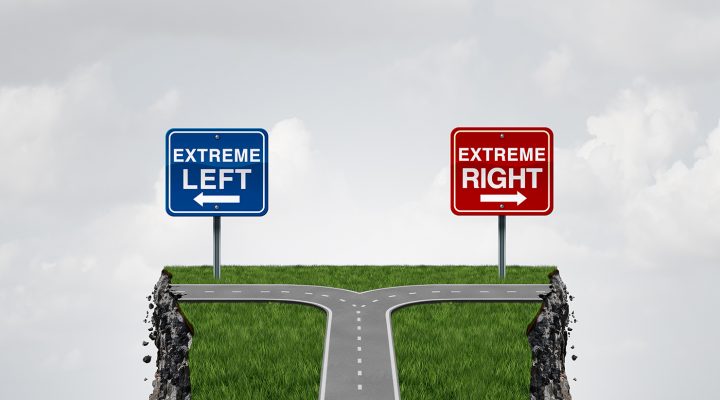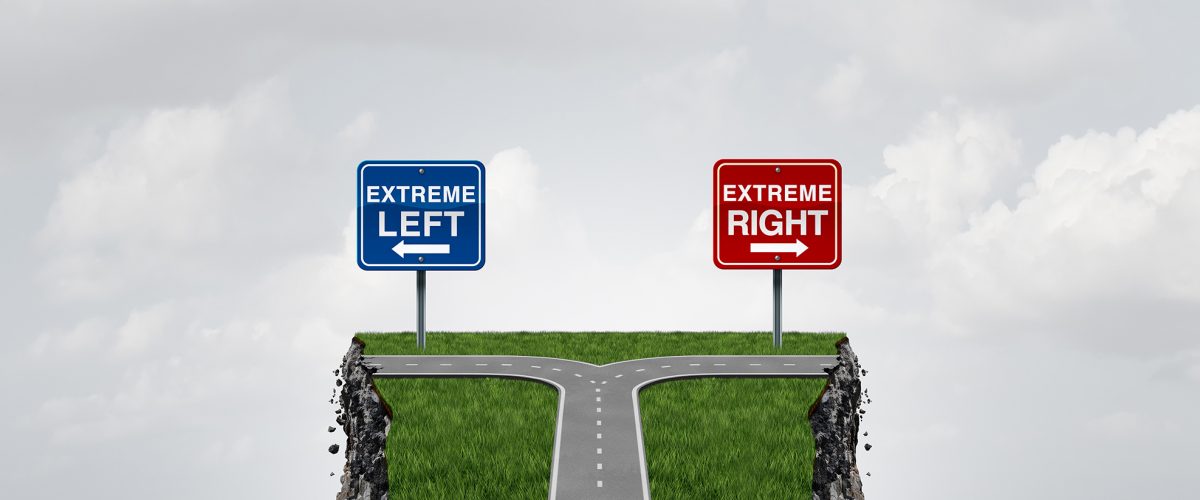Roaring “isms” roam the streets, looking for someone to devour — or at least brainwash.
Who knew we’d reach such a moment, given Americans’ long aversion to ideology and indifference toward the philosophical battles that have ravaged much of the rest of the world?
Yet here we are. A partial list of the ideological “isms” claiming a significant following at the moment includes: Christian nationalism; isolationism; populism; extreme rightism; extreme leftism; religious fundamentalism; nihilism; anarchism; capitalism; socialism; Marxism; fascism; racism; antiracism; deconstructionism; feminism; Zionism; antisemitism; genderism; sexism; and Trumpism.
I’m not saying these ideological commitments are equally good or bad. Some are odious in any form; some are positive forces if not taken to extremes. Extremism is the problem with ideology. Ideologues, like cult leaders, demand complete submission to their beliefs and declarations. Any deviation is condemned as betrayal — to be punished by expulsion from the company of true believers.
“Ideologues, like cult leaders, demand complete submission to their beliefs and declarations.”
That’s one of the many reasons I abandoned ideological conservatism years ago and became a “radical moderate.” In a 2020 column advocating that approach, I quoted Peter Wehner, senior fellow at The Trinity Forum:
Moderation does not mean truth is always found equidistant between two extreme positions, nor does it mean that bold and at times even radical steps are not necessary to advance moral ends. But there are general characteristics we associate with moderation, including prudence, the humility to recognize limits (including our own), the willingness to balance competing principles and an aversion to fanaticism. Moderation accepts the complexity of life in this world and distrusts utopian visions and simple solutions. The way to think about moderation is as a disposition, not as an ideology. Its antithesis is not conviction but intemperance.
But moderation of any kind, Wehner lamented, “is out of step with the times, which are characterized by populist anger and widespread anxiety, by cross-partisan animosity and dogmatic certainty. Those with whom we have political disagreements are not only wrong; they are often judged to be evil and irredeemable. In such a poisonous political culture, when moderation is precisely the treatment we need to cleanse America’s civic toxins, it invariably becomes synonymous with weakness, lack of conviction and timidity.”
Extremism never sleeps
Wehner wrote that eight years ago. It still applies. And although extremist right-wing nationalism and populism are the biggest threats currently facing American (and European) democracy, extremism on the left never sleeps. The demonstrations against Israel currently roiling college campuses offer a vivid example.
American college students have every right to protest Israel’s brutal military actions targeting Palestinians in Gaza — and U.S. military support for them. They have every right to demand the universities they attend divest from any financial involvement with Israel. They even have the right to protest the existence of the state of Israel as an illegal occupation and support the establishment of a Palestinian state in its place.
The question is: How did they come to such political commitments, while ignoring other global conflicts claiming far more lives?
Honest outrage at U.S-supported injustice, to be sure. The influence of pro-Palestinian advocacy groups, undoubtedly. But the simplistic appeal of absolutist ideology, divorced from reality, plays a role.
New York Times columnist Ross Douthat wondered what freshmen at Columbia University — site of some of the most intense anti-Israel protests in recent weeks — read and study in their “core curriculum” — a “defined set of works that every undergraduate (is) expected to encounter … to expose students to the best that has been thought and said.”
First, hats off to Columbia for still insisting on such a core, which used to be required of any college student claiming to be educated. Many American “universities” now require nothing, offering instead a hodgepodge of choices having little or nothing to do with the foundations of Western civilization. At Columbia, the required reading list includes Plato, Aristotle, Genesis, Job, Aeschylus, Augustine, Shakespeare, Lock, Rousseau and Adam Smith, along with important writings from non-Western cultures once omitted at most universities.
“Ideology doesn’t do nuance. It doesn’t fit on a protest sign.”
“But then comes the 20th century, and suddenly the ambit narrows to progressive preoccupations and only those preoccupations: anticolonialism, sex and gender, antiracism, climate,” Douthat observes. “Many of these readings are absolutely worth engaging. (Some of them I have even assigned in my own limited experiments in teaching.) But they still embody a very specific set of ideological commitments. …
“The first effect is a dramatic intellectual narrowing. In the Columbia curriculum’s 20th century readings, the age of totalitarianism simply evanesces, leaving decolonization as the only major political drama of the recent past. There is no Orwell, no Solzhenitsyn; Hannah Arendt’s essays on the Vietnam War and student protests in America are assigned but not ‘The Origins of Totalitarianism’ or ‘Eichmann in Jerusalem.’”
Is it unfair to ask whether such a slanted perusal of recent history sounds like what ideologues on the opposite extreme are subjecting younger students to when they ban certain books from public school libraries? No, universities aren’t banning essential books, per se; they are simply hiding and ignoring them.
‘Enemy of convenience’
Thus Israel becomes “a kind of enemy of convenience for a left-wing worldview that otherwise lacks real-world correlates for its theories,” Douthat writes. Israelis are racist “white settlers,” colonizing the land of brown Palestinians like the evil white European colonists of old.
Israel is many things, but it is not the product of white European colonialism. It is a historically unique nation state, consisting of the descendants of the most hated and persecuted minority in human history. And despite the number of European Jews who streamed into Israel after surviving the Holocaust, there are far more “brown” (Iberian, Middle Eastern and North African) Jews living in Israel than “white,” northern European Jews, who constitute only about 30% of the population.
But that involves historical complexity and nuance. Ideology doesn’t do nuance. It doesn’t fit on a protest sign.
Conservatives have accused colleges and universities of left-wing ideological bias for decades. They’re doing it again in the current fevered debate over Israel. It’s an old charge. It’s tired. It’s stale. But I have yet to hear it effectively refuted.
Identity politics continues to poison debate on both ends of the ideological spectrum. And it descends far too easily into hate.

Erich Bridges
Erich Bridges, a Baptist journalist for more than 40 years, has covered international stories and trends in many countries. He lives in Richmond, Va.
Related articles:
There is no center | Opinion by Mark Wingfield
Now is the moment for radical moderation | Opinion by Erich Bridges
We have a teachable moment, and we’re blowing it | Opinion by Susan Shaw


